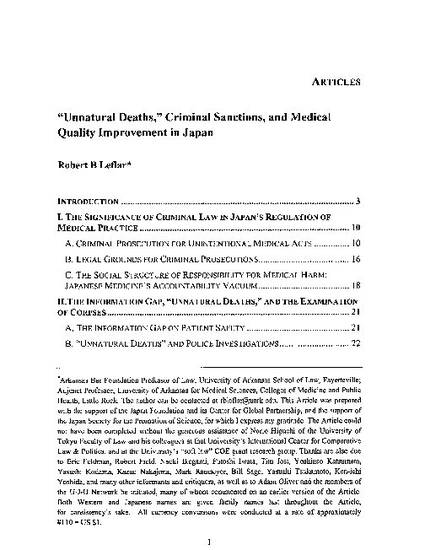
Article
"Unnatural Deaths," Criminal Sanctions, and Medical Quality Improvement in Japan
Yale Journal of Health Policy, Law, and Ethics
Disciplines
Abstract
A worldwide awakening to the high incidence of preventable harm resulting from medical care, combined with pressure on hospitals and physicians from liability litigation, has turned international attention to the need for better structures to resolve medical disputes in a way that promotes medical safety and honesty toward patients. The civil justice system in the United States, in particular, is criticized as inefficient, arbitrary, and sometimes punitive. It is charged with undermining sound medical care by encouraging wasteful expenditures through defensive medicine; by driving information about medical mistakes underground where it escapes analysis, undercutting quality improvement efforts; and by forcing physicians in liability-prone specialties such as obstetrics out of practice. Similar charges are leveled against medical injury compensation systems in the United Kingdom, Australia, and elsewhere. While these criticisms have been strongly countered, they have gained a foothold in the public imagination sufficient to place structural reform of medical litigation on the American political agenda.
One enlightened response to mounting concerns over medical error and liability has been a partial shift in focus, in the United States and other Western nations, from the blameworthiness of individual physicians to the correction of system-related deficiencies in the quality of care, and from confrontational litigation between patients and health care providers to a more integrative approach emphasizing disclosure to patients and families of the underlying facts and apology for harm done. Drawing in considerable measure on Wagatsuma and Rosett's pioneering 1986 article explaining the importance of apology (in non-medical settings) in Japan, the scholarship in this area portrays honest disclosure as more than an ethical and professional duty, and sincere apology as more than a way of fulfilling the emotional needs of patients, families, and medical personnel. These scholars, and the "Sorry Works!" movement that their writing has spurred, also assert that contrary to long-standing assumptions of liability insurers and hospital defense lawyers, disclosure and apology have in fact the practical benefit of diffusing some of the dissatisfaction that leads to compensation claims, thereby potentially shrinking liability burdens. While its likely effects on lawsuit filings are contested, the disclosure-and-apology philosophy is gaining considerable traction in medical practice.
Compared with the United States, Japan (like most countries) enjoys a comparatively low rate of civil litigation over medical injury. What accounts for this relative paucity of medical lawsuits? The stereotype of a nation populated by long-suffering victims with a cultural aversion to the assertion of rights has long been punctured. Are there simply fewer medical injuries in Japan, due to the prevalence in hospitals of the strict quality control for which the nation's manufacturing enterprises are justly famed? When injury claims do arise, are they quickly resolved through non-punitive, harmony-promoting informal dispute resolution processes employing the traditional social lubricant of apology, as the scholarship drawing on the Wagatsuma-Rosett thesis would presume?
Not exactly.
Citation Information
Robert B Leflar. ""Unnatural Deaths," Criminal Sanctions, and Medical Quality Improvement in Japan" Available at: http://works.bepress.com/rbleflar/1/
